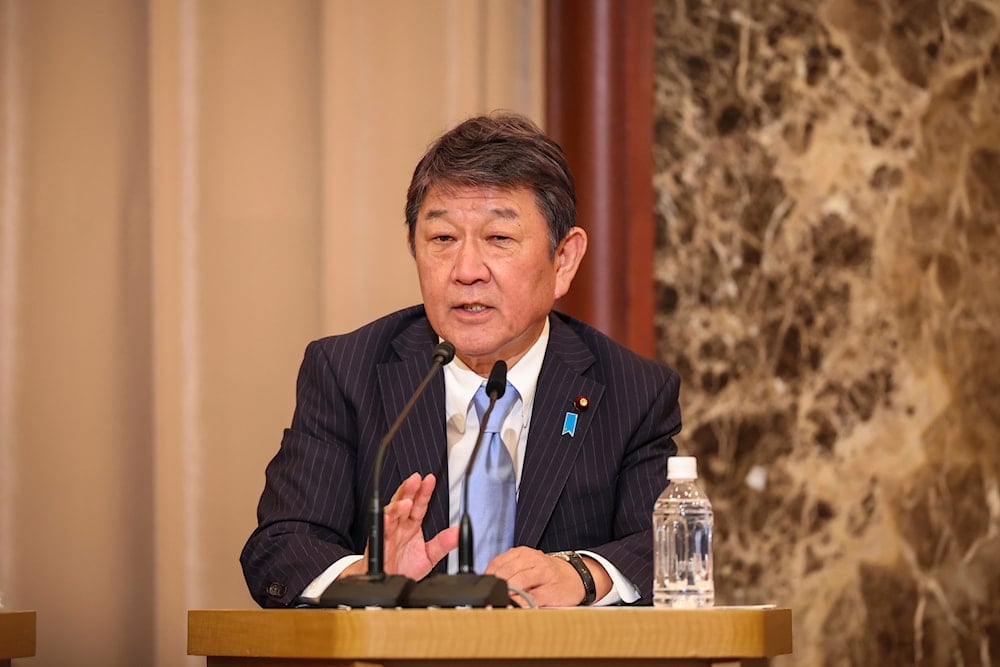Ex-minister dubbed 'Trump whisperer' joins Japan PM bid
Toshimitsu Motegi enters the Japan leadership race after Shigeru Ishiba’s resignation, as the LDP prepares to elect a new leader amid political turmoil.
-

Japan's Liberal Democratic Party (LDP) Secretary General Toshimitsu Motegi, a candidate for the party's presidential election, speaks during a debate at the Japan National Press Club in Tokyo, Saturday, Sept. 14, 2024 (AP)
Following Prime Minister Shigeru Ishiba's resignation announcement, a former top diplomat known as the "Trump Whisperer" was the first to declare his candidacy for the leadership position on Monday.
Former Foreign Minister Toshimitsu Motegi is positioning himself to lead the world's fourth-largest economy, which is currently navigating significant turbulence from rising food prices and the fallout from US tariffs on its crucial auto sector.
Party heavyweight Motegi told reporters of his decision to run, stating, "We have to move Japan forward, resolving difficult issues at home and abroad," adding, "I have made up my mind to run."
Motegi, a 69-year-old former LDP secretary general and trade minister who is among a clutch of contenders likely to emerge in the coming days and who possesses strong English skills, was dubbed the "Trump whisperer" for his deft handling of tricky US-Japan trade talks during his time as a Harvard-educated politician.
Sanae Takaichi, a 64-year-old hardline nationalist and one-time heavy metal drummer who previously lost to Ishiba in 2024, has also emerged as a candidate with the potential to become Japan's first female premier.
The telegenic Shinjiro Koizumi, a 44-year-old surfing enthusiast and son of a former prime minister who most recently served as Ishiba's farm minister with a mandate to lower rice prices, represents another potential contender who might enter the race.
LDP set to select new leader
After Prime Minister Shigeru Ishiba said Sunday he would step down because his party fared terribly in two elections, the long-dominant Liberal Democratic Party (LDP) is set to elect its new chief, reportedly in early October.
During a turbulent 11 months at the helm, Ishiba, who was initially seen as a safe pair of hands, lost his majority in both houses of parliament, dealing a major blow to the Liberal Democratic Party (LDP), which has governed Japan almost continuously since 1955. According to reports, repeated calls for him to take responsibility for the electoral losses rendered his position untenable.
According to a party official who spoke with AFP, the LDP will discuss when and how to elect its new president this week, though the new leader will still require approval from both chambers of parliament to officially become Japan's prime minister.
There is a small possibility that the LDP president could fail to secure the necessary vote, as the ruling coalition of the LDP and the Komeito party currently holds a minority position in both parliamentary houses.
"The LDP needs to find someone who can unite the party, appeal to the public, but also someone who can gain support from other parties," Waseda University professor Kensuke Takayasu told AFP.
Yen weakens, Japan stocks make gains
The yen weakened and Japanese equities climbed after Prime Minister Shigeru Ishiba announced over the weekend that he plans to resign, Bloomberg reported. The currency dropped as much as 0.8% against the dollar on concerns that political instability could lower the likelihood of the Bank of Japan raising rates. Meanwhile, equities gained on the back of the softer yen and speculation of additional government stimulus once a new leader takes office.
Broader Asian markets also advanced as traders increased bets on Federal Reserve rate cuts following weak US payrolls data. European equity futures hovered in a tight range, while French government bond futures held steady ahead of Monday’s confidence vote that could see François Bayrou’s government collapse.
The uncertainty over Ishiba's successor has rattled investors. “Markets are concerned that the next LDP leader will lean more towards fiscal expansion,” said Carol Kong, strategist at Commonwealth Bank of Australia in Sydney. “The bottom line is the yen will remain under downward pressure in the near term.”
Japan’s Nikkei 225 rose 1.2% and the Topix gained 0.9%. The MSCI Asia Pacific Index edged up 0.3%. Strategists at Bloomberg noted, “FX traders will need to consider the risk of jawboning from US officials if the yen weakens too quickly. Although traders will be expecting a delay to the next BOJ rate hike amid political uncertainty, the flip side is a weaker dollar as the Fed will be expected to at least discuss a 50-bp rate cut this month after the soft US jobs data.”
Investor sentiment across Asia was further supported by expectations that the Fed will cut rates at all three of its remaining meetings this year. US futures inched higher after the S&P 500 slipped on Friday.
Technology stocks led the gains in Asia, with Alibaba and Tencent driving the regional index. Pop Mart International, however, slumped after a huge rally earlier this year. “Global equities still remain around record highs and investors are ostensibly treating the slowdown as a ‘bad news is good news’ scenario because of expected rate cuts,” said Kyle Rodda, senior analyst at Capital.com. “The flow is going into tech names which are ‘growthier in nature’ with cyclicals sold on the prospect of a weaker US economy.”

 5 Min Read
5 Min Read










